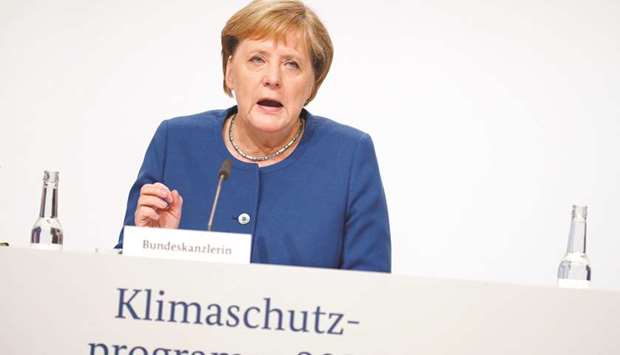Following weeks of wrangling and all-night negotiations, Germany’s coalition government has agreed on a climate package costing more than €54bn ($59bn), Finance Minister Olaf Scholz said yesterday.
The measures include a ban on installing oil-fired heating in buildings from 2026, with a subsidy for householders prepared to switch to more climate-friendly alternatives.
Up to 40% of the costs for switching to alternatives would be covered under this plan.
A price for emissions of carbon dioxide has also been agreed, that will take effect via trading in emissions certificates.
This will result in price increases for petrol and diesel.
The plan also foresees measures to alleviate the burden on consumers, with commuters being able to deduct €0.35 per kilometre of driving from tax returns.
This marks an increase from the current €0.30 per kilometre.
The aim is for petrol and diesel to rise in price by €0.03 per litre in 2021, increasing to €0.10 by 2026.
Petrol currently costs around €1.40 a litre and diesel around €1.30 in Germany.
The government’s aim is to cut greenhouse gas emissions by 55% by 2030, in comparison with 1990 levels.
The country is expected to fail to reach its interim target set for next year.
German Chancellor Angela Merkel said that since this was the case, it was only right that there should be consequences.
She said the new plan was supposed to act as “a sort of guarantee” that the goals for 2030 are achieved.
Setting a carbon dioxide price was a crucial aspect of the government talks, as was funding for expanding the use of renewables.
Land-based wind power has run into regulatory obstacles, with local residents objecting to their construction.
Much of the focus was on transport during the talks.
Emissions have stalled at 1990 levels, despite considerably more efficient engines, as a result of a rise in personal travel and goods freight.
Scholz said the government did not plan on taking out new debt to finance the switch.
The CO2 price for fossil fuels is to begin at €10 per tonne, rising by degrees to €35 per tonne by 2025.
Thereafter the price will be determined in trading within a stipulated corridor.
There are also plans to make rail travel cheaper by cutting value-added tax on rail tickets.
Flying will become more expensive by raising the tax on planes taking off from German airports from January 1, 2020.
Current weak demand for electric vehicles is to be boosted by subsidies on cars costing less than €40,000, and vehicle tax will be aligned more closely with CO2 emissions.
Environmental organisations said they were disappointed by the measures.
Greenpeace said that after months of negotiations, all that remained was a set of measures that would not ensure that Germany meets international climate commitments.
The head of Greenpeace in Germany, Martin Kaiser, called the government plans “laughable”.
German environmental organisation DUH said the measures were nothing but “empty promises”.
“From changing to 100% renewables to presenting concrete plans to pull out from coal, oil and natural gas – this plan does not show any true will for serious climate protection,” said DUH head Sascha Mueller-Kreanner.
The World Wildlife Fund (WWF) said the package was a “mixture of despair, postponement and failure”.

Merkel: the new plan is supposed to act as ‘a sort of guarantee’ that the goals for 2030 are achieved
